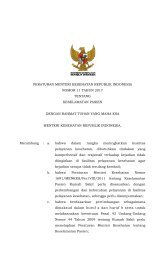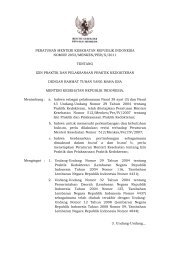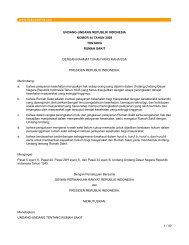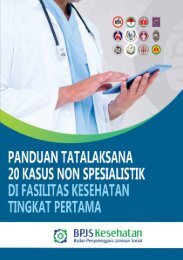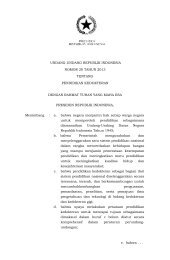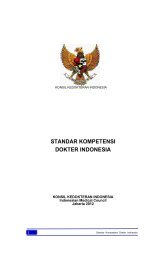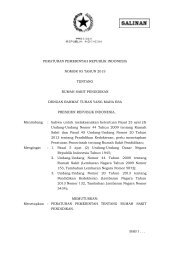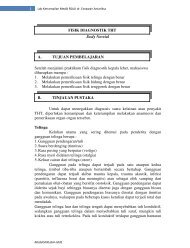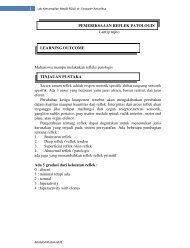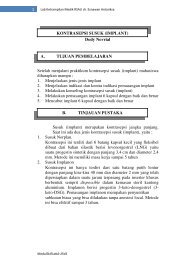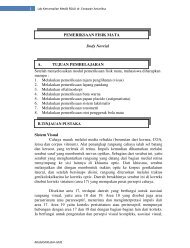Advanced Trauma Life Support ATLS Student Course Manual 2018
You also want an ePaper? Increase the reach of your titles
YUMPU automatically turns print PDFs into web optimized ePapers that Google loves.
313<br />
APPENDIX E n <strong>ATLS</strong> and <strong>Trauma</strong> Team Resource Management<br />
The vast majority of trauma teams work well<br />
together and achieve positive outcomes for their<br />
patients. When controversies do arise, they are dealt<br />
with professionally and calmly, if possible away from<br />
the patient being resuscitated. Much can be learned<br />
from discussions about the challenges of managing<br />
trauma victims. The more patients the team treats, the<br />
more experienced the members become and the more<br />
clearcut these situations are to address. <strong>Trauma</strong> team<br />
members can prepare for their role by learning <strong>ATLS</strong>®<br />
principles as well as the basics of performance within<br />
the medical team.<br />
SummARy<br />
Where resources allow, the best management of a<br />
trauma victim is by a trained trauma team with a<br />
competent and skilled trauma team leader. <strong>ATLS</strong>®<br />
principles are fundamental to the function of the<br />
trauma team. All trauma team members should be<br />
<strong>ATLS</strong>® providers with experience in the resuscitation<br />
room. <strong>Trauma</strong> team leaders require specific skills and<br />
competencies as well as considerable experience in the<br />
delivery of trauma care according to <strong>ATLS</strong>® standards.<br />
<strong>Trauma</strong> team members can prepare for their part in the<br />
treatment of trauma and learn from their experiences<br />
in different trauma teams.<br />
Bibliography<br />
1. Alimo-Metcalfe B. A critical review of leadership<br />
theory. In: Lewis R, Leonard S, Freedman A, eds.<br />
The Psychology of Organizational Development,<br />
Leadership and Change. London, UK: Wiley<br />
Blackwell; 2013.<br />
2. Avery GC. Understanding Leadership. London,<br />
UK: Sage Publications; 2004.<br />
3. Avolio BJ, Sosik JJ, Jung DI, et al. Leadership<br />
models, methods, and applications. Handbook<br />
of Psychology: Industrial and Organizational<br />
Psychology (Vol. 12). Hoboken, NJ: John Wiley<br />
& Sons; 2003:277–307.<br />
4. Blakar RM. Communication: A Social Perspective<br />
on Clinical Issues. Oxford, UK: Oxford University<br />
Press; 1985.<br />
5. Brewer N, Wilson C, Beck K. Supervisory behavior<br />
and team performance among police patrol<br />
sergeants. J Occup Organ Psych 1994:67; 69–78.<br />
6. Burford B. Group processes in medical education:<br />
learning from social identity theory. Med Educ<br />
2012;46:143–152.<br />
7. Burke CS, Stagl KC, Klein C, et al. What type of<br />
leadership behaviors are functional in teams? A<br />
meta-analysis. Leadership Q 2006;17:288–307.<br />
8. Cant S, Killoran A. Team tactics: a study of nurse<br />
collaboration in general practice. Health Ed J<br />
1993;52(4):203–208.<br />
9. Chowdhury S. The role of affect- and cognitionbased<br />
trust in complex knowledge sharing. J<br />
Managerial Issues 2005;17(3):310–327.<br />
10. Collins J. Good to Great. London, UK: Random<br />
House; 2001.<br />
11. Dreachslin JL, Hunt PL, Sprainer E.<br />
Conceptualizing diversity and leadership:<br />
evidence from 10 cases. Educ Management Admin<br />
& Leadership 2006 April;34:151–165.<br />
12. Fernandez R, Nozenilek JA, Hegerty CB, et al.<br />
Developing expert medical teams: towards an<br />
evidence based approach. Acad Emerg Med 2008<br />
Nov;15:11:1025–1036.<br />
13. Field R, West MA. Teamwork in primary<br />
health care, 2: Perspectives from practices. J<br />
Interprofessional Care 1995;9(2):123–130.<br />
14. Goleman D, Boyatzis R, McKee A. Primal<br />
Leadership: Unleashing the Power of Emotional<br />
Intelligence. Boston, MA: Harvard Business Press;<br />
2013.<br />
15. Helmich E, Bolhuis S, Laan R, et al. Entering<br />
medical practice for the very first time: emotional<br />
talk, meaning and identity development. Med<br />
Educ 2012;46:1074–1087.<br />
16. Komaki JL, Desselles ML, Bowman ED. Definitely<br />
not a breeze: extending an operant model of<br />
effective supervision to teams. J Appl Psychol<br />
1989;74:522–529.<br />
17. Kozlowski SW, Gully SM, Salas E, et al.<br />
Team leadership and development: theory,<br />
principles and guidelines for training leaders<br />
and teams. In: Beyerlein MM, Johnson DA,<br />
Beyerlein ST, eds. Advances in Interdisciplinary<br />
Studies of Work Teams: Team Leadership (Vol 3).<br />
Greenwich, CT: Elsevier Science/JAI Press; 1996:<br />
253–291.<br />
18. Lim B-C, Ployhart RE. Transformational<br />
leadership: relations to the five-factor model<br />
and team performance in typical and maximum<br />
contexts. J Appl Psychol 2004 Aug;89(4):<br />
610–621.<br />
19. Micklan MS, Rodger SS. Effective health care<br />
teams: a model of six characteristics developed<br />
from shared perceptions J Interprofessional Care<br />
2005;19(4):358–370.<br />
20. Newell S, David G, Chand D. An analysis of trust<br />
among globally distributed work teams in an<br />
organizational setting. Knowledge and Process<br />
Management 2007;14(3):158–168.<br />
n BACK TO TABLE OF CONTENTS





